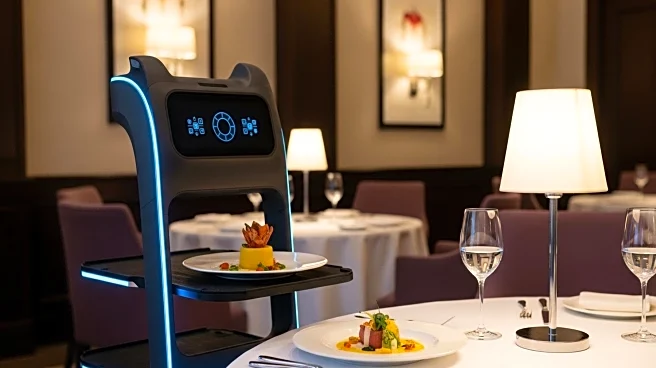What is the story about?
What's Happening?
The premium dining and hospitality industry is experiencing a significant recovery in 2025, driven by changes in consumer behavior and technological advancements. Diners are increasingly seeking affordability, experiential value, and sustainability, which presents unique investment opportunities in restaurant technology, luxury hospitality, and service optimization. Hyper-personalization is reshaping food and beverage offerings, with restaurants adopting hyper-local, hyper-seasonal menus to meet wellness-driven preferences. AI-driven predictive analytics are helping hotels optimize pricing strategies and enhance guest satisfaction, while IoT-enabled devices improve in-room comfort. Loyalty programs are evolving to focus on emotional engagement, with personalized offers increasing return rates.
Why It's Important?
The transformation in the hospitality and dining sectors is crucial as it aligns with broader consumer trends towards wellness and personalized experiences. This shift offers significant opportunities for investors and businesses to capitalize on emerging technologies and consumer preferences. The integration of AI and IoT in hospitality not only enhances guest experiences but also drives operational efficiency, which is vital in a competitive market. The evolution of loyalty programs from transactional to emotional engagement can strengthen customer relationships and increase brand loyalty, providing a competitive edge. As the industry adapts to these changes, stakeholders who embrace innovation and personalization stand to gain significantly.
What's Next?
The hospitality and dining sectors are likely to continue evolving with a focus on integrating technology and personalization. Businesses may invest more in AI-driven solutions and IoT devices to enhance guest experiences and operational efficiency. The trend towards wellness-driven experiences and hyper-personalization is expected to grow, with more restaurants adopting quality-sourced ingredients and personalized menus. Loyalty programs will likely become more sophisticated, leveraging data analytics to offer tailored promotions and rewards. As the industry navigates labor shortages and sustainability demands, strategic investments in staff training and automation will be crucial for maintaining service quality and operational excellence.
Beyond the Headlines
The shift towards hyper-personalization and AI-driven solutions in hospitality and dining raises ethical and cultural considerations. The use of AI to predict consumer behavior and preferences may lead to privacy concerns, requiring businesses to implement robust data protection measures. Additionally, the focus on wellness-driven experiences reflects a broader cultural shift towards health-conscious living, influencing not only dining habits but also lifestyle choices. The integration of technology in hospitality may also impact employment, as automation could reduce the need for certain roles, necessitating a reevaluation of workforce strategies and training programs.
















